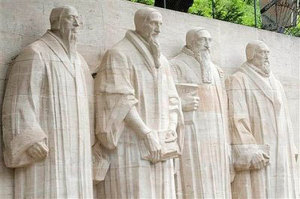Just War in Iraq
When the war began in Afghanistan, Defense Secretary Donald Rumsfeld asked a handful of religious leaders to brief him on just-war doctrine. Most of us gave high marks to the administration's efforts to meet just-war standards. I asked, however, the one discordant question: "How would the administration justify a preemptive strike on Iraq?" Without hesitation, Rumsfeld cited the precedent of Israel's attack on an Iraqi nuclear plant in 1981.
One year later, the question is no longer hypothetical. As I write, U.S. forces are massing for war with Iraq. By the time you read this, troops may be in Baghdad. But whatever happens, the morality of a preemptive strike will continue as a hot debate. Last September, the President drew the battle line, boldly declaring preemption as a national policy.
This issue is of particular concern to Christians since we are the heirs of the just-war tradition formulated by Augustine 1,600 years ago. Historically, the doctrine's requirement of just cause has been defined as responding to an attack.
But has terrorism changed the rules? Should the doctrine be "stretched," as just-war expert George Weigel argues? Can a preemptive strike be morally justified?
The first response from the church was negative. U.S. Catholic bishops oppose an attack unless Iraq can be linked to the September 11 terror strikes. One hundred Christian ethicists announced opposition; so did the general secretary of the Middle East Council of Churches. The new Archbishop of Canterbury and Pope John Paul II both expressed reservations.
But I think this reflects too narrow an understanding of just war. Our attitudes may be unduly influenced by Cold War memories. For four decades, the world was kept in relative peace—at least from nuclear holocaust—by nuclear checkmate. The West and the U.S.S.R. embraced the policy of Mutual Assured Destruction, in which both sides targeted the other's cities. Neither side dared attack, fearing a hugely destructive retaliatory strike; with civilians deliberately targeted, preemption was unthinkable.
But this was not the case before the Cold War. Proponents of "anticipatory self-defense" frequently cite a famous precedent of the British attacking across Niagara to prevent an invasion by Irish revolutionaries in Canada. And no less a Christian eminence than Sir Thomas More wrote, "If any foreign prince takes up arms and prepares to invade their land, they immediately attack him in full force outside their own borders."
In the run up to World War II, many argued that Hitler should not be appeased. European leaders engaged in extraordinary—and we now realize counterproductive—diplomatic efforts to avoid war. Had the allies had the weapons, would a preemptive strike against the Nazis have been justified before they overran Poland? In hindsight the answer is clear, as it was to the Christian pastors who were executed for conspiring to kill Hitler.
The question of preemptive strike turns on facts. For 12 years, Saddam Hussein has mocked the United Nations and the world. If he is, as the U.S. and British believe, stockpiling weapons of mass destruction and acting in concert with terrorists, he forfeits claims of sovereign immunity.
Unlike the Cold War, when early warning systems could detect missile launches, terrorists give no warning. If Saddam Hussein were to prepare a missile for launch, the U.S. would certainly be warranted in firing in self-defense. Giving a terrorist a dirty bomb to be delivered in a suitcase is no different—except for delivery time—from a missile launch.
Of course, all of this presupposes solid intelligence and the goodwill of U.S. and Western leaders. I find it hard to believe that any President, aware of the awesome consequences of his decision and of the swiftness of second-guessing in a liberal democracy, would act recklessly.
Christians should remember that the just-war doctrine is not grounded in revenge, punishment, or even justice. Thomas Aquinas discussed it in Summa Theologica—not in the section on justice but in the section on charity (that is, the love of God). As Christian scholar Darrell Cole writes, "The Christian who fails to use force to aid his neighbor when prudence dictates that force is the best way to render that aid is an uncharitable Christian. Hence Christians who willingly and knowingly refuse to engage in a just war…fail to show love towards their neighbor as well as towards God."
Out of love of neighbor, then, Christians can and should support a preemptive strike, if ordered by the appropriate magistrate to prevent an imminent attack.
By Charles Colson





























